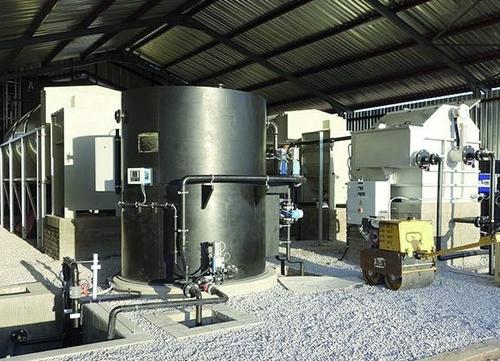Sanitation and water reuse
Approximately 40 % of the urban population in Namibia does not have access to sanitation facilities. CuveWaters combines sanitation and wastewater treatment with reuse of water and fertilisers in agriculture, energy generation, and a community-based approach. Special attention is paid to changing hygiene behavior in order to prevent waterborne diseases.
Outapi, a municipality with about 4,600 inhabitants, was chosen for implementing the sanitation and water reuse infrastructure. Up to 1,500 inhabitants in pre-formal neighborhoods benefit. The concept includes individual connection of houses, small and communal washhouses. The municipality and the end users committed themselves to manage the facilities by self-organization.
Sanitation facilities, wastewater treatment and agricultural irrigation
A vacuum sewer system with flush toilets was chosen for sewage conveyance from the settlements to a wastewater treatment plant. This ‘closed system’ helps to overcome the threat of faecal emissions during seasonal floods in the area.
In a first step, wastewater is transported from the sanitation facilities to a vacuum station and the wastewater treatment plant. There, it is pre-treated anaerobically and further purified with rotating biological contactors. Organic compounds are oxidized and nutrients largely remain in the water for fertigation purposes. Then, remaining solids and pathogens are removed with the help of a micro sieve and UV radiation. Finally, the water is stored in a pond for reuse on the irrigation site. There is also the option producing biogas from the sludge and biomass of the agricultural irrigation site, which can be used to generate electricity and heat. The processed sludge itself is utilized as fertilizer and to improve the structure of the soil.
Community Health Clubs
As a fundamental approach in this process, CuveWaters is adapting “Community Health Clubs” in the Outapi pilot settlements. Community Health Clubs are set up locally and invite all community members to participate in regular sessions over several months. They learn together and share their experiences about preventable diseases, domestic hygiene, a balanced diet, food preparation, water-related health behaviour and how to use and maintain sanitation facilities.
Values, attitudes and behavior need to be adapted to the new sanitary model. CuveWaters has already used a community-based approach during the preparation phase and is continuing this process while implementing the sanitation facilities.
The NGO Africa AHEAD is cooperating with the CuveWaters project and adapting the concept of the Community Health Clubs for Outapi. The NGO Development Aid People for People (DAPP) is conducting the process of establishing and facilitating the Health Clubs.
Read more about the success factors for implementation of this method as well as the achievements documented within the CuveWaters project.

